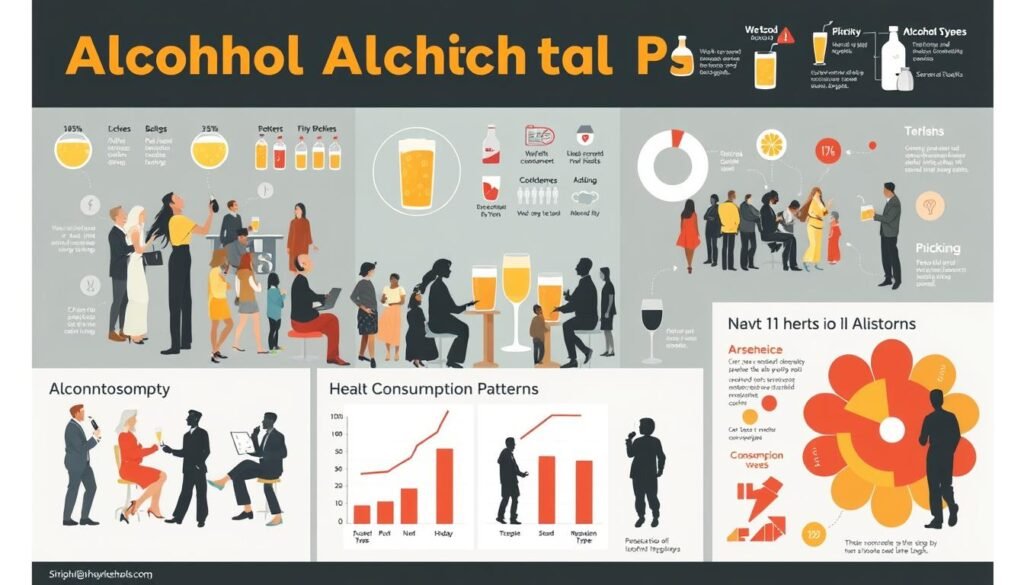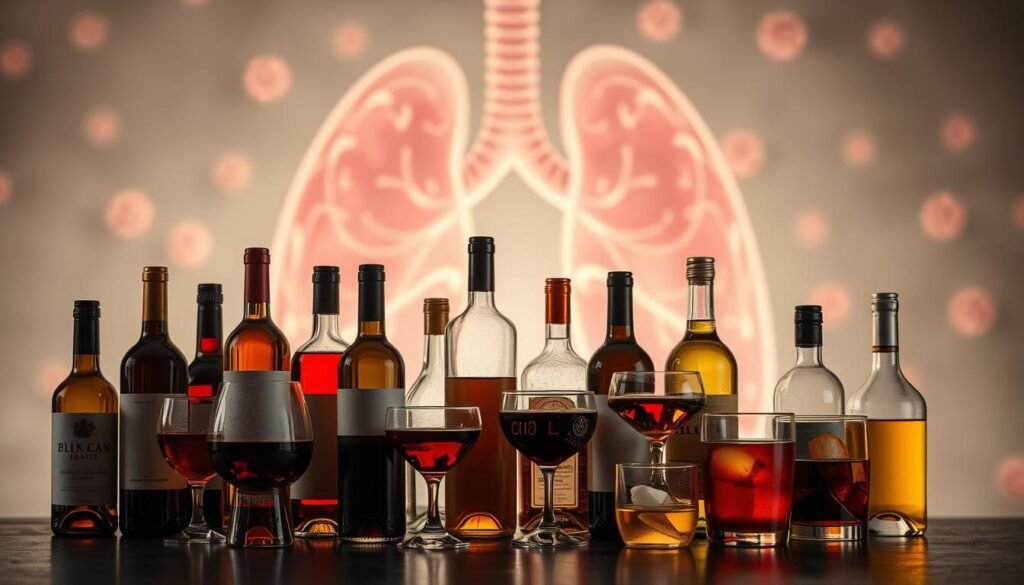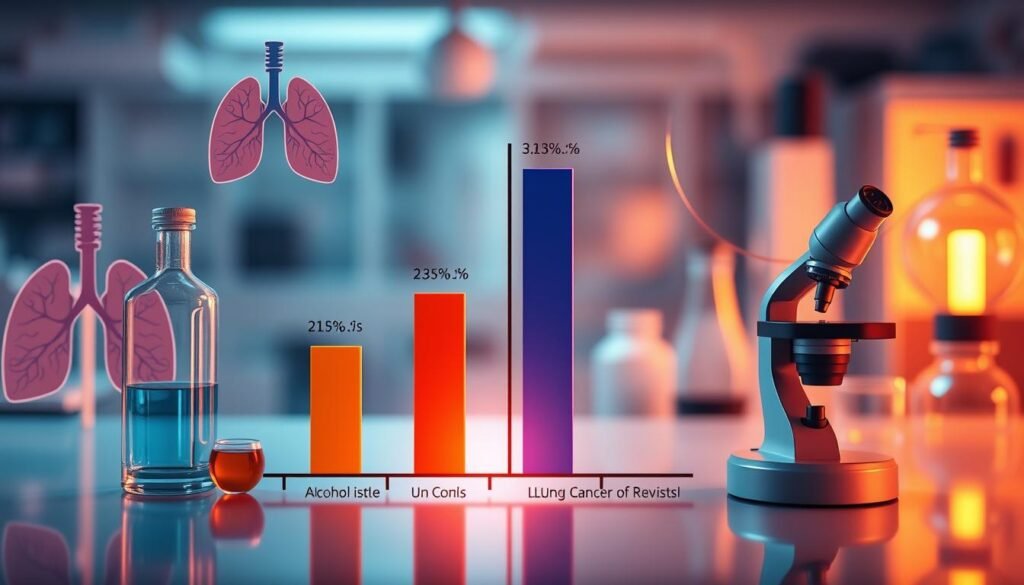Alcohol is linked to 3 million deaths each year, including over 400,000 from cancer. This sparks a big question: does drinking alcohol raise your chance of getting lung cancer, even if you’ve never smoked? Since lung cancer is a top cause of cancer deaths worldwide, it’s crucial to explore this possible link. Recent studies suggest a connection between alcohol and some respiratory cancers, but we need to look more closely.
There’s a lot of talk about how alcohol might affect cancer risk. It’s key to base public health advice on solid evidence. One study looked at 22 studies and found something interesting. People who drank a little bit had a lower chance of getting lung cancer than those who didn’t drink at all. This was especially true for folks who enjoyed wine and liquor. To learn more about these findings, click here.
Key Takeaways
- Alcohol is behind about 6% of all cancers and 4% of cancer deaths in the U.S.
- Drinking a small amount of alcohol might lower lung cancer risk in people who’ve never smoked.
- Drinking alcohol can lead to several cancer types, like those of the mouth, throat, liver, and breast.
- It’s best for men to not have more than 2 drinks a day and women to stick to 1 drink.
- Women who drink moderately over their lives may increase their risk of breast cancer.
- Research on how alcohol affects lung cancer risk is ongoing and developing.
The Relationship Between Alcohol and Lung Cancer
It’s crucial to understand how drinking alcohol and lung cancer risk factors relate. While smoking is the top cause of lung cancer, we cannot ignore alcohol. Research shows alcohol might play a part in lung cancer, but it’s often secondary.
Understanding Lung Cancer Risk Factors
A range of elements, from pollution to genes to lifestyle, can raise lung cancer risk. Though smoking is key, alcohol’s link to lung cancer is also important. Studies show heavy drinkers who smoke have a higher lung cancer risk.
Overview of Alcohol as a Carcinogen
Alcohol is labeled a top-tier carcinogen by the International Agency for Research on Cancer. This means it could help cause various cancers, including lung cancer, by causing oxidative stress and inflammation. Moreover, heavy drinking can hurt the liver. This issue can change how lung cancer drugs work and affect results.
The direct link between drinking and lung cancer isn’t clear-cut, but alcohol’s role in cancer is significant. Those with alcohol use disorder might see more inflammation, possibly raising cancer risk in the lungs. The American Cancer Society suggests drinking less to prevent cancer. Drinking less can help lung health and recovery from treatments.
| Alcohol Consumption Level | Lung Cancer Risk |
|---|---|
| 0.5 to | HR = 0.89 (95% CI: 0.82, 0.96) |
| ≥ 7 drinks/day | HR = 1.11 (95% CI: 1.00, 1.24) |
Current Research Insights on Alcohol and Lung Cancer Risk
Recent studies give us new insights about alcohol and lung cancer risk. They combined data from different studies under the International Lung Cancer Consortium. The goal is to understand alcohol’s impact on lung cancer better. It looks at how different amounts of drinking affect lung cancer risk.
Pooled Analysis of Case-Control Studies
This analysis combined 21 case-control studies and one cohort study. It found an interesting pattern between drinking alcohol and lung cancer risk. People who drink a moderate amount of alcohol seemed to have a lower risk than heavy drinkers. This important finding suggests we need more research on how different drinks relate to lung cancer.
Significant Findings from the International Lung Cancer Consortium
Findings show not all drinks are the same when it comes to lung cancer. Some research points out that wine might lower lung cancer risk. On the other hand, beer seems to have a different link, especially with squamous cell carcinoma. There’s a J-shaped connection, but it’s not clear yet what it means for lung cancer risk. We still need to learn a lot, especially how our bodies react to alcohol. For more info, read this research article.
| Type of Alcohol | Associations with Lung Cancer |
|---|---|
| Wine | Possible inverse association, further research needed |
| Beer | Positive association with squamous cell carcinoma |
| Spirits | Data inconclusive, requires additional studies |
Can Alcohol Cause Lung Cancer?
Looking into how drinking alcohol might lead to lung cancer is tricky, especially for people who never smoke. It’s important to see how different drinking habits affect this risk. Studies have found that people with cancer often drink a lot. For example, about 25% of those in cancer treatment have reported binge drinking. This shows a tendency to take risks despite being unwell.
Investigating Consumption Patterns Among Never Smokers
Research shows a clear link between drinking alcohol and lung cancer in people who don’t smoke. The risk of lung cancer can jump by 30% for heavy drinkers who’ve never smoked. Also, certain genes linked to alcoholism could connect drinking with lung cancer.
Confounding Variables in Studies
Studying the tie between alcohol and lung cancer in non-smokers is complex. Many studies missed key factors like lifestyle and diet. This oversight can make the alcohol-lung cancer link seem unclear. So, scientists are working hard to figure out how alcohol really affects lung health.

Alcohol Consumption and Different Types of Lung Cancer
The link between alcohol and lung cancer is complex, especially with the various types of lung cancer. Some cancers like squamous cell carcinoma and adenocarcinoma react differently to alcohol. Studies show heavy drinking, more than three drinks a day, increases lung cancer risk in non-smokers. This challenges the idea that smoking is the only big risk.
Histological Subtypes and Their Associations
Research into alcohol’s impact on lung cancer is eye-opening. Squamous cell carcinoma, for one, has a greater link to alcohol use disorder. This might be because of certain gene variants connected to both alcoholism and lung cancer risk. On the other hand, adenocarcinoma’s risk doesn’t spike with alcohol use. This shows the risk isn’t the same across all cancer types.
Differences by Type of Alcohol Beverages
The kind of alcoholic drinks people consume affects lung cancer risks differently. Heavy drinkers of beer and spirits face more risks than wine drinkers. Each drink has its unique chemicals that could change cancer risk. Knowing these patterns helps in figuring out lung cancer risks across various groups.
| Type of Alcohol Beverage | Risk Level Associated with Lung Cancer | Histological Subtype Association |
|---|---|---|
| Beer | Higher risk with heavy consumption | Linked to squamous cell carcinoma |
| Wine | Moderate risk; may even lower risk slightly | Less associated with specific subtypes |
| Liquor | Significantly higher risk with heavy drinking | Stronger correlation with squamous cell carcinoma |

Quantifying Alcohol Intake and Lung Cancer Risk
It’s key to understand how drinking alcohol relates to lung cancer risk. Studies found a J-shaped association between them. This means a small amount of alcohol might lower some cancer risks. People drinking 10–19.9 grams of ethanol daily could have a lower lung cancer risk.
The J-Shaped Association with Consumption Levels
The J-shaped link shows alcohol’s complex effect on cancer risk. Drinking lightly, like one drink a day, changes cancer risk. For example, it can raise esophageal cancer risk by 30% and breast cancer by 5%. This makes the story on moderate drinking more complicated.
Implications of Low vs. High Alcohol Consumption
Comparing low to high drinking levels shows big effects on health. Light drinkers see fewer risks, but heavy drinkers face more cancer threats. Heavy drinking strongly increases lung cancer risk. Studies show heavy drinkers die more from cancer. They say about 4.1% of all cancer cases worldwide are due to alcohol. This suggests we need to change drinking guidelines for safety.

Health experts can better counsel on alcohol risks by understanding drinking levels. To learn more on alcohol and lung cancer, check out this resource. For info on allergies and lung cancer, visit this article.
Impact of Alcohol Abuse on Lung Health
Chronic alcohol abuse harms your lungs. It is linked to lung diseases and damage. Evidence shows drinking too much alcohol causes both immediate and long-term lung problems.
Alcohol-Related Pulmonary Cancers
Studies show a connection between heavy drinking and lung cancer risk. Drinking a lot causes inflammation, which might lead to lung cancer. While it’s complex how alcohol directly affects lung cancer, its link to other cancers is clear.
People who drink too much are at higher risk. This is due to other health issues they might have from drinking.
Long-Term Effects of Excessive Drinking
Drinking too much can cause respiratory problems like pneumonia and tuberculosis. Alcohol use disorder weakens the immune system. This makes people more likely to catch lung diseases.
Health organizations stress drinking in moderation. They recommend limiting alcohol to avoid health risks. Heavy drinkers should be careful, as even moderate drinking has risks.
Understanding Alcohol’s Mechanism of Action
Alcohol doesn’t just affect you in the moment. Its metabolism can harm lung tissue and might lead to cancer. Knowing how this happens shows the dangers of drinking too much. This is vital for understanding lung cancer risks.
How Alcohol Metabolism Affects Lung Tissue
While the liver mainly processes alcohol, its harmful byproducts can reach the lungs. These substances cause oxidative stress. This damages cells and might start the growth of tumors. So, alcohol’s effects are a concern for lung health.
Potential Carcinogenic Effects in the Lungs
The International Agency for Research on Cancer labels alcoholic drinks as highly carcinogenic. Research shows a clear connection between drinking and the risk of many cancers, including those in the lungs. Alcohol’s damage to lung tissue might speed up cancer development.
Even light drinking poses a cancer risk, including to the lungs. It’s critical to further study alcohol’s impact on lung health.
Public Health Implications and Recommendations
It’s vital to understand how alcohol and lung cancer are linked. This knowledge helps us create important public health advice about alcohol. By knowing the risks, communities can make smarter choices to lower cancer risks from drinking.
Guidelines for Alcohol Consumption
Guidelines help people choose how much alcohol is safe. They offer limits to reduce health risks, like cancer. Here are some important tips:
- Men should have no more than two drinks a day. Women should limit to one drink.
- It’s crucial to know that even moderate drinking ups cancer risk.
- Knowing how alcohol affects you over time helps make better drinking decisions.
Raising Awareness About Lung Cancer and Drinking
We need to boost awareness about lung cancer and drinking. Informative campaigns can change how people see drinking. Successful efforts might look like this:
- Education efforts that show the dangers of drinking, especially with tobacco use.
- Outreach that stresses regular lung cancer screenings and the perks of catching it early.
- Using social media to share stories of cancer and alcohol.
We can promote healthier living by showing how alcohol affects lung cancer risk. This education helps people choose healthier lives and know the dangers of too much drinking.
| Risk Level | Daily Alcohol Intake | Associated Lung Cancer Risk |
|---|---|---|
| Low | 1 drink (women); 2 drinks (men) | Minimal |
| Moderate | 3-4 drinks | Increased risk |
| High | 5+ drinks | Significantly higher risk |
Conclusion
The link between drinking alcohol and getting lung cancer is intricate. Studies show that alcohol might not be the main cause of lung cancer. However, it’s still a key factor, especially with other risks like smoking.
Alcohol is more closely linked to certain cancers, such as those of the head, neck, esophagus, and liver. This highlights alcohol’s role in cancer and the need for public health to take it seriously.
About 3.5% of cancer deaths in the U.S. are linked to alcohol. Thus, public health officials encourage people to make smart choices about drinking. Knowing how much you drink and your risk factors can help lower lung cancer rates. Future studies should dig deeper into these links to help prevent cancer.
Even if drinking now and then might be okay for some, not drinking at all is the safest choice. This advice is key for reducing lung cancer risk and staying healthy overall. It shows how crucial it is to be aware and educated about the dangers of drinking.